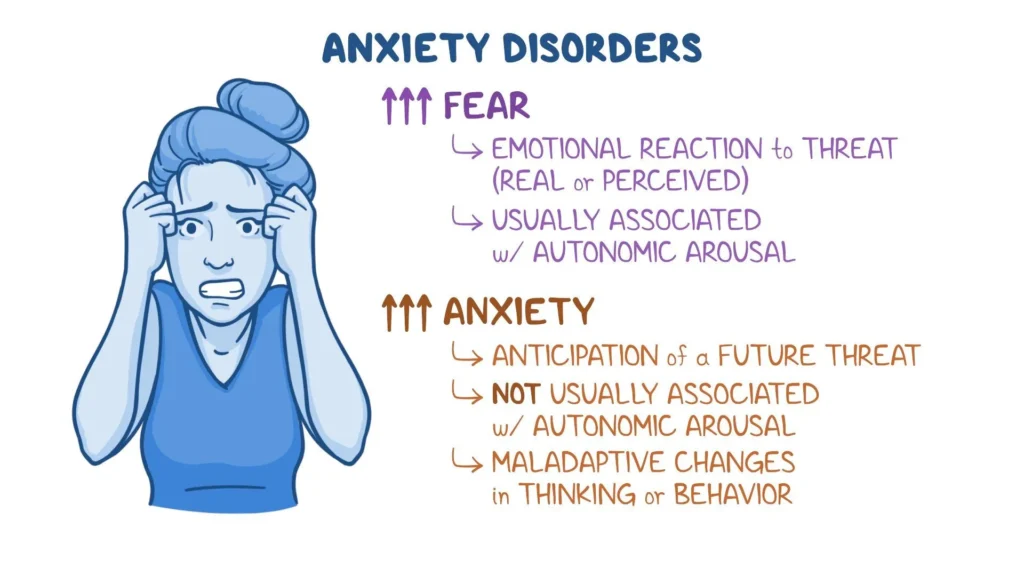What You Should Know About Anxiety and Brain Health

What is Anxiety
Anxiety is a natural response to stress. It’s your body’s way of warning you of danger or helping you prepare for a challenge. However, when anxiety becomes constant, overwhelming, or out of proportion, it can turn into a mental health disorder.
At Kampala EEG & Medical Lab, we often assess patients experiencing persistent anxiety to identify both emotional and neurological causes.
How Anxiety Affects the Brain
Chronic anxiety doesn’t just influence your mood—it can change how your brain functions over time. Here’s how:
Amygdala Overactivity – This part of the brain controls fear and threat detection. Anxiety causes it to become hyperactive, increasing your emotional reactivity.
Hippocampus Shrinkage – Responsible for memory and learning, the hippocampus may shrink with prolonged anxiety, affecting concentration and decision-making.
Prefrontal Cortex Impairment – This area handles reasoning and control. Anxiety disrupts its function, making it harder to think clearly or calm down.
These brain changes can make anxiety feel like it’s taking over your entire life.

Common Symptoms of Anxiety
While anxiety manifests differently from person to person, some signs are easy to spot:
Constant worrying or fear
Racing thoughts
Trouble sleeping
Rapid heartbeat or shortness of breath
Muscle tension or headaches
Feeling restless or “on edge”
Difficulty concentrating
These symptoms can range from mild to severe and may interfere with work, school, or relationships.
Can EEG Tests Help with Anxiety?
While EEG (Electroencephalogram) tests don’t diagnose anxiety directly, they can help rule out brain abnormalities or neurological issues that mimic anxiety symptoms. At our clinic, we sometimes recommend an EEG test if symptoms are severe, unexplained, or linked to possible brain function changes.
When to Seek Help for Anxiety
If your anxiety is interfering with your daily life, lasting for more than six months, or worsening over time, it’s time to see a doctor or mental health professional. Early diagnosis can prevent further brain health complications and lead to faster recovery.
At Kampala EEG Lab, we provide compassionate care, including assessments that support your mental and neurological well-being.
More Posts
Epilepsy Symptoms, Causes & Treatment Options in Uganda: What You Need to Know
Epilepsy affects thousands in Uganda, yet many struggle without a proper diagnosis. This post breaks down the most common symptoms, causes, and available treatments. Discover how early EEG testing at Kampala EEG Lab can offer clarity, support, and a better quality of life for those living with seizures.
Signs of Depression You Shouldn’t Ignore
Feeling low from time to time is normal—but what if it doesn’t go away?
How an EEG Test Can Help You Sleep Better – Kampala’s #1 Sleep Disorder Test
Struggling with poor sleep, unexplained fatigue, or nighttime restlessness?
An EEG test may reveal the root cause.
Discover how a simple brain scan at Kampala EEG Lab can help diagnose sleep disorders and restore your rest.
Simple Ways to Support Your Brain Health Today
Even with anxiety, there are steps you can take to protect and improve your brain function:
-
Get enough sleep
-
Practice deep breathing and relaxation
-
Stay physically active
-
Eat brain-boosting foods (like leafy greens and omega-3s)
-
Seek support from professionals when needed
Your brain matters. Don’t wait until anxiety takes over—take action now.
Ready to take control of
your brain health?
Schedule your EEG test at Kampala EEG Laboratory today and join the thousands of Ugandans who have benefited from our services. Contact us now to learn more about how we can help you on your journey to optimal brain health.
All Rights Reserved By Kampala EEG laboratory.
- All Rights Reserved By Kampala EEG Laboratory
